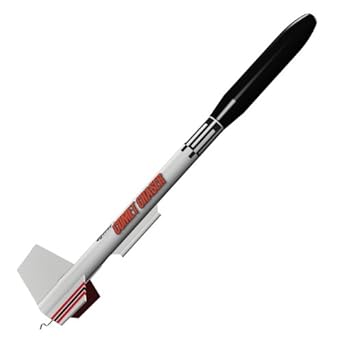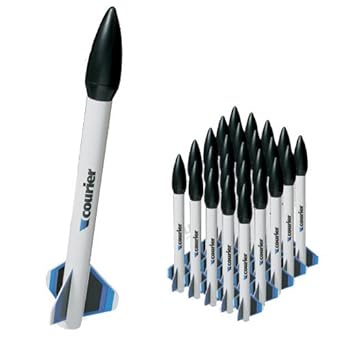First thing I decided was to abandon the idea of making launch controllers for everybody. That would have required some soldering, something I didn't want to go into with the kids. And while I have soldered, I'm not terribly good at it, and the thought of soldering up to 30 launch controllers in a week was not terribly appealing to me, and I wasn't sure I'd have enough time to do it.
I'd considered a couple of rocket bulk packs other than the Estes Alpha. One I nearly selected was the Estes Comet Chaser.
I liked the large fins on this rocket, and the payload compartment. But the lower portion of the rocket is minimum diameter, and you have to line the fins up just right so they will fit over the Mylar ring which holds the motor hook in place. And due to the fatter payload section, the launch lug had to go on top of a standoff. I wasn't sure how dextrous the kids would be, and getting those bits lined up just right is critical.
I also toyed with the idea of doing egg lofting - the practice of launching an egg payload and getting it back uncracked.
This is a popular challenge for kids, as you get to launch something which is fragile, but not alive - launching live animals is definitely a no-no.
There are a lot of great egg lofters on the market, but I needed a bulk pack, and the one I liked best was the Quest Courier.
It's a great little rocket. But Quest has this listed as a Skill Level 2 rocket. Skill levels are kind of an arbitrary classification system, with every rocketry company having its own standards, and some Skill Level 2 rockets are quite simple to build, but I didn't want to risk having a rocket which was too complex. And there was a launch lug standoff again. I decided that egg lofting, while fun, was more than we needed to deal with for what would be many kids' first rockets.
I even considered offering the kids the option of choosing between two rockets - the Comet Chaser and the Alpha. In the end, I realized things would go better if we all built the same rocket. That way, I could control how quickly or slowly we went through certain steps.
I decided to stick with the Estes Alpha bulk pack. I requested three of them. That turned out to have unintended consequences...
I was hoping to get a kit before classes began, so I could build a display model. With the kids, I certainly wouldn't take all the time to do the fussy detail work I usually do on a rocket - filling the tube spirals, shaping and filling the fins, sanding the flash off the nose cone, etc. That alone could take the whole week. Some kids might go on to build intricately detailed models, but to start with, it's best to keep things simple. Get the rockets built, and launch them into the sky.
But I wanted to have a nice model to show the kids. I wasn't able to get my hands on one before the first week started. I figured I'd make one for weeks two and three. The first session would probably be a little haphazard anyway, with me figuring out the structure of the class, and getting an idea of what was enough material, and what was too much.
Other Concerns
Would it be OK for the kids to use hobby knives? One-on-one, with your own kids, this is probably fine. If I had a classful of 10 kids - other people's kids - would this be OK, or too dangerous? I was assured by the camp director that this would be fine, and they had done it in the past. I decided I'd keep an eye on everyone, only let one child use a knife at a time if necessary, and do the cutting myself if it came to it.
Painting - could the kids use spray paint, or did we need to opt for hand-painting rockets? Or skip the painting altogether?
This turned out to be great - Ivy Tech had a brand new, ventilated, indoor spray painting booth. I failed to take a picture of it, but it looked much like this:
There were added flaps at the bottom to keep all paint inside the booth. All fumes were filtered out the top. You couldn't smell a thing - I'd like one of these at home!
How much would be enough material to fill a week? How much would be too much? 3 hours a day for 5 days is a lot. A teacher friend of mine suggested that you always have more material than you think you will need. You can drop something extra on the fly, but if you end up finishing something early, you need to have more.
My Goal
People say that rockets are educational. They certainly can be. But it depends. A lot of kids get a ready-to-fly kit for a birthday, launch it for a summer, maybe lose it in a tree, maybe launch a few more... And then get bored, never really learning how they work, or where they can go from those beginnings. I wanted my kids to see that they could do a lot with rocketry - and that, even if they quit the hobby in a few years, they've gotten something more out of it than simply burning some black powder. I wanted them to see that they could design their own rockets, if they kept it up. That if they put their minds to it, they could actually accomplish something - maybe get on a TARC team in high school and get a scholarship. Maybe move on to high power rockets as adults. Maybe more. And I wanted to motivate them to explore more. Basically, I was hoping they'd do their math and science homework, because there are fun things you can accomplish if you do the hard stuff.
The Plan - Part 1
My brief attempt at stand-up comedy taught me that when anything goes, if it's all up to me, I can have a million ideas and no structure to them. I decided I would write out a basic plan structured around the build of the rocket. The idea was to build during the week, and launch on Friday. I obtained the Alpha kit instructions online, read through them, and sketched out a plan.
I wanted to start with something exciting to get everyone jazzed up, so I figured first thing Monday, we'd launch a couple of rockets. Not only would this be fun, it would give me the opportunity to demonstrate the stages of rocket flight - powered flight, the coasting phase, ejection and recovery - as well as introduce some safety rules.
Then, of course, the weather looked like it was going to be bad - wind and rain. I'd have to hope for the best, and if we couldn't go outside, I'd show a video of a model rocket launch.
Monday, after the launch, we'd talk about the parts of a rocket, examine the kits, glue a few things together, talk about rocket safety while the glue dried, then glue some more stuff together.
By Friday, we'd have built and launched rockets, talked about some science, watched some videos, and even started talking about designing and building our own rockets. Easy-peasy.
Then Monday came, and the whole plan went out the window...
Like my Facebook page for blog updates.





No comments:
Post a Comment